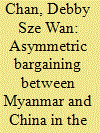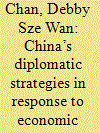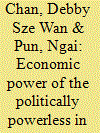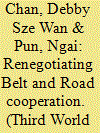|
|
|
Sort Order |
|
|
|
Items / Page
|
|
|
|
|
|
|
| Srl | Item |
| 1 |
ID:
153720


|
|
|
|
|
| Summary/Abstract |
The Myitsone Dam suspension is an asymmetric negotiation between Naypyitaw and Beijing. The bilateral agreement of the hydropower project was concluded in 2009. However, Myanmar's civil society started to oppose the dam when political opportunities expanded in 2011. The quasi-civilian government in Myanmar was caught in an ‘audience cost dilemma': either to disappoint domestic constituents by fulfilling international obligations, or to compensate the Chinese dam developer for breaching the contract. In September 2011, Myanmar President Thein Sein declared the suspension of the dam throughout his tenure. Unexpectedly, China's state-owned dam company did not sue Naypyidaw. Moreover, Beijing even engaged with societal actors in Myanmar to seek their support for the project. How could Naypyitaw defy Beijing in this Myitsone Dam case? Drawing from 35 interviews with anti-dam campaigners and other stakeholders, as well as secondary data, this article argues that the rise of civil society successfully conditioned Naypyitaw's diplomatic options in the controversy. The change of Beijing's diplomatic strategy confirms that domestic constraint in Myanmar is not rhetorical. The Myitsone Dam case is an example that shows bilateral agreement without domestic endorsement can become China's business risk. Presumably, the dispute has wider implications for other Chinese overseas projects outside Myanmar.
|
|
|
|
|
|
|
|
|
|
|
|
|
|
|
|
| 2 |
ID:
174863


|
|
|
|
|
| Summary/Abstract |
How do societal actors in the host country matter to Beijing’s diplomatic strategies? In the course of political transition in Myanmar, the Myitsone Dam was suspended in 2011, and the China–Myanmar High-Speed Railway was reportedly halted in 2014. Since then, Beijing is said to have adopted public diplomacy in response to these economic setbacks. However, this article finds variations in Beijing’s approaches; Beijing actively engaged with the dam challengers, but not the railway opponents, who offered less of a challenge. Moreover, Beijing tolerated the project’s suspension in the dam case, but ramped up pressure in the railway case by increasing Naypyitaw’s costs of defection. Beijing’s inconsistent diplomatic approaches are attributed to different levels of social opposition observed in the anti-Chinese project movements. As such, Beijing has the propensity to bypass societal actors and pressure Naypyitaw for project continuation if it perceives that social opposition is not a major obstacle in bilateral economic cooperation.
|
|
|
|
|
|
|
|
|
|
|
|
|
|
|
|
| 3 |
ID:
171028


|
|
|
|
|
| Summary/Abstract |
This commentary seeks to stimulate discussion about grassroots resistance that has taken on conglomerates in the faceless and leaderless 2019 pro-democracy movement in Hong Kong. The scale, scope, and time span of these protests is unprecedented in the city and, at the time of writing, there is no sign they will soon abate. Behind eye-catching scenes of black-clad protesters filling the streets, a sea of light in assemblies, rounds and rounds of tear gas fired by police, people covered in blood, and burning shops, is an emerging economic resistance movement that aims to generate alternative political resources in an acutely imbalanced bargaining structure between protesters and the government.
|
|
|
|
|
|
|
|
|
|
|
|
|
|
|
|
| 4 |
ID:
175529


|
|
|
|
|
| Summary/Abstract |
In what way can societal actors in transitional polities play a role in influencing bilateral economic agreements? Societal actors are often ignored in the state-centric international relations literature. We, however, contend that social resistance to a foreign development project can reshape the international outcome, even under an asymmetric bargaining structure, if two conditions are met: the host country’s policy options are conditioned by citizens’ resistance; and the home country is eager to continue cooperation. To make this argument, this paper examines the social resistance to the China-backed Letpadaung copper mine in Myanmar amid the host country’s democratisation. Employing a process-tracing technique and drawing upon extensive interviews from 2015–2019, official documents and secondary data, we argue that a popular anti-mining movement transformed a previous state-to-state bargaining process into a two-level game negotiation. As a result, the rise of societal actors was able to disrupt project implementation and extract concessions from China in exchange for project resumption.
|
|
|
|
|
|
|
|
|
|
|
|
|
|
|
|
|
|
|
|
|